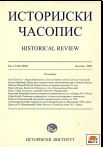Босански "лутајући витезови" Паштровићи
Paštrović Family, the "Wandering Knights" from Bosnia
Author(s): Đuro TošićSubject(s): History
Published by: Istorijski institut, Beograd
Keywords: The Paštrović family; Aleksa; Ostoja; Radič; Konavle; Dubrovnik; Kotor; sultan; Porte
Summary/Abstract: Having been involved into the fierce conflict between Sandalj Hranić, Bosnian duke, and Đurađ II Balšić, rouler of Zeta, the five sons of Radoslav Paštrović (Andrija, Nikolica, Aleksa, Ostoja and Radič), moved from the region Paštrović family possessed into Kotor and became citizens of the forementioned town. They have probably been incited to act consequently, after Kosača left the battle field, by fear of Balšić' revenge. Some time later, Aleksa, Ostoja and Radič moved from Kotor into the region of Trebinje where they acquired some land properties, due to the support Sandalj offered to them. The inhabitants of Dubrovnik „honored“ them as close and dignified neighbors by having issued citizenships to them; they also donated to them certain sums of money on a number of occasions, but, nevertheless, the „ungreatful“ newcomers often stole the cattle from the peasants of Astarea of Dubrovnik and robbed merchants’ goods in the hinterland. However, the members of the Paštrović family became, above all, widely known as diplomats staying at the courts of the most prominent Bosnian lords (Kosača and Pavlović), and of the kings Tvrtko II Tvrtković and Stefan Ostojić. Duke Radosav Pavlović used, most likely, to pay the largest sums of money for the obtained favours; due to this, Aleksa moved to Pavlović’ court, having left Sandalj and Tvrtko II, and became the main „expert“ for resolving the issues concerning his part of Konavle with Dubrovnik. Upon coming to Pavlović' court, he found his younger brother Ostoja there, who has already built up the image of an unordinary and controversial diplomat, through his senseless efforts employed to prove to the sultan and to his viziers by means of lies, bribe and corruption that his master did not sell, but only put under hypothecation Konavle to the inhabitants of Dubrovnik, who refused to give the region back to him, after having effectuated the payoff of their debts. The youngest brother Radič has also been active in the diplomacy field, but not as much as his older brothers (Aleksa and Ostoja). He stayed at Pavlović' court until the duke lost the region of Trebinje in 1439, and was afterwards „nominated“ nobleman and diplomat of the Duke and Herceg Stefan Vukčić Kosača. After approximately a decade spent in Kosača's service, he got into the prison of Dubrovnik under unknown circumstances in the middle of the 1450's, and thus anticipated the disappearence of Paštrović family, the „wandering knights“ from the historical stage.
Journal: Историјски часопис
- Issue Year: 2009
- Issue No: 58
- Page Range: 147-172
- Page Count: 26
- Language: Serbian

